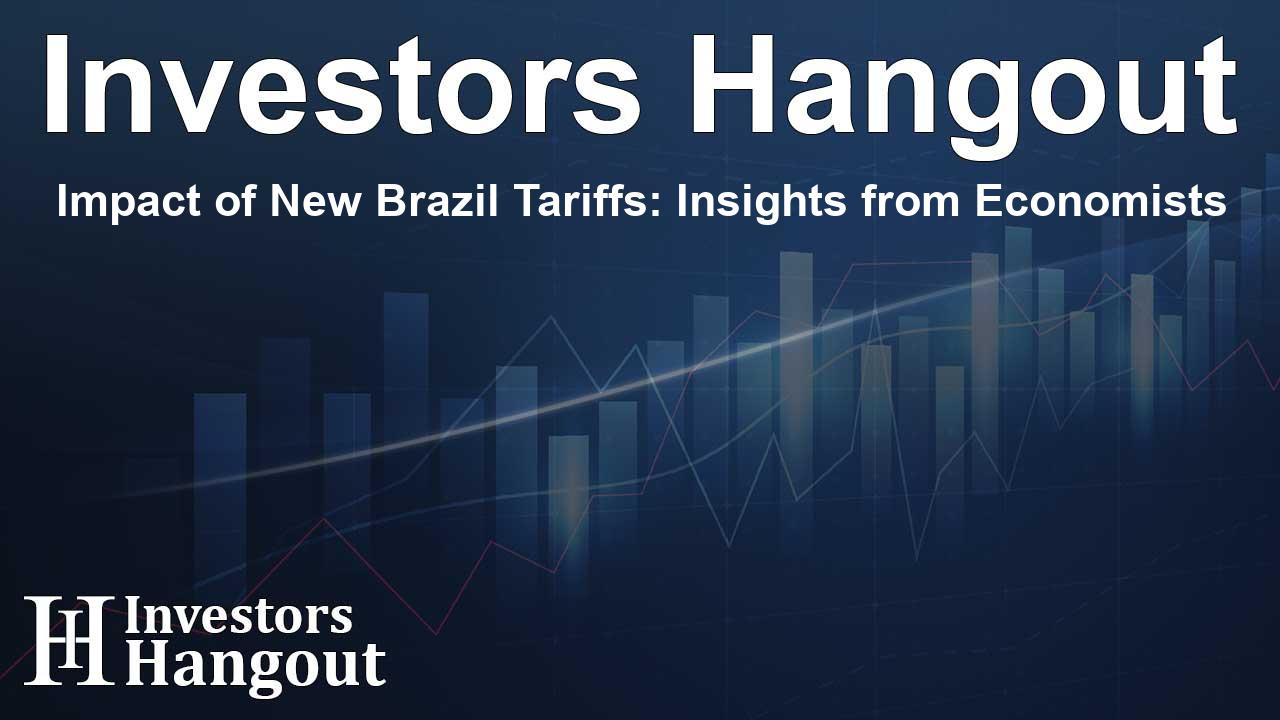Impact of New Brazil Tariffs: Insights from Economists

Trump's Tariff Decisions and Economic Impacts
In a recent debate on trade policies, economist Justin Wolfers has raised significant concerns regarding President Donald Trump’s imposition of a staggering 50% tariff on imports from Brazil. Wolfers, known for his insightful economic analysis, argues that such tariffs are misguided and will adversely affect American consumers without addressing any supply chain issues domestically.
Understanding the Rationale Behind the Tariffs
On social media, Wolfers shared his skepticism about the justification for the tariffs, marking it as a politically charged move rather than a strategic economic policy. He emphasized that this tariff could significantly increase the cost of goods for American consumers, effectively acting as a tax that punishes the very people it aims to protect. With an aim to support U.S. industries, one has to wonder if imposing tariffs during tense political climates is the right approach.
Political Messaging Over Economic Policy
Wolfers articulated that the 50% tariff, described as a response to Brazil's treatment of its political dissenters, becomes less about trade and more about signaling support for certain political narratives. The economist's remarks that “your next coffee now comes with an insurrection infusion fee” poignantly captures the irony of how domestic consumers bear the burden of international political conflicts. Such statements resonate uniquely in today’s globalized economy, where the lines between foreign policy and trade are increasingly blurred.
The Broader Economic Implications of the Tariffs
This recent development has left many economists bewildered. Questions arise regarding the implications of Trump’s tariffs on Brazil, especially amidst the ongoing trade surplus the U.S. has maintained with the South American country for over a decade. Trade experts express that such policies set troubling precedents in international trade relations and could lead to retaliatory measures.
Brazil's Response to Imposed Tariffs
Brazilian President Luiz Inácio Lula da Silva has vocally opposed these tariffs, asserting that his nation will uphold its judicial sovereignty while handling its political matters. Da Silva made it clear that Brazil would not succumb to what he refers to as 'tutelage' from outside forces, hinting at ongoing tensions between the two nations.
Future Reciprocity in Trade
In a robust defense, President da Silva proposed the principle of reciprocity, indicating that if the U.S. imposes tariffs, Brazil will respond in kind. He emphasized that if the tariffs on Brazilian exports remain at 50%, similar tariffs would be levied against American imports, raising questions about the potential for an escalating trade war.
Consumer Costs and Market Stability
The economic discussions surrounding Trump’s tariffs underscore vital consumer implications. Many Americans who enjoy products such as coffee may feel the pinch directly in their wallets, as the increased tariffs inevitably pass down costs to consumers. This has led to anxiety among coffee lovers and countless others who rely on Brazilian imports.
Potential Responses from Economists
Many financial analysts are suggesting that a more nuanced approach is needed. They advocate for identifying ways to support local industries without getting caught up in politically driven tariff wars that could disrupt the market. This could involve securing partnerships and developing domestic production capabilities while maintaining steady import channels.
Frequently Asked Questions
What led to Trump's decision to impose tariffs on Brazil?
Trump imposed the tariffs as a response to Brazil's handling of political dissent, suggesting a connection between trade policy and foreign political actions.
How will these tariffs affect American consumers?
The tariffs are expected to increase costs for American consumers, particularly for goods like coffee, as businesses pass on the added costs of tariffs.
What is Brazil's stance on the tariffs?
Brazilian President Luiz Inácio Lula da Silva has rejected the tariffs, insisting on maintaining judicial sovereignty and promising reciprocal action.
What do economists say about the tariffs?
Economists like Justin Wolfers argue that the tariffs are detrimental to American consumers and lack a strategic economic rationale.
Can retaliatory tariffs escalate tensions?
Yes, retaliatory tariffs could lead to increased tensions and a potential trade war, impacting both nations' economies adversely.
About The Author
Contact Dylan Bailey privately here. Or send an email with ATTN: Dylan Bailey as the subject to contact@investorshangout.com.
About Investors Hangout
Investors Hangout is a leading online stock forum for financial discussion and learning, offering a wide range of free tools and resources. It draws in traders of all levels, who exchange market knowledge, investigate trading tactics, and keep an eye on industry developments in real time. Featuring financial articles, stock message boards, quotes, charts, company profiles, and live news updates. Through cooperative learning and a wealth of informational resources, it helps users from novices creating their first portfolios to experts honing their techniques. Join Investors Hangout today: https://investorshangout.com/
The content of this article is based on factual, publicly available information and does not represent legal, financial, or investment advice. Investors Hangout does not offer financial advice, and the author is not a licensed financial advisor. Consult a qualified advisor before making any financial or investment decisions based on this article. This article should not be considered advice to purchase, sell, or hold any securities or other investments. If any of the material provided here is inaccurate, please contact us for corrections.
